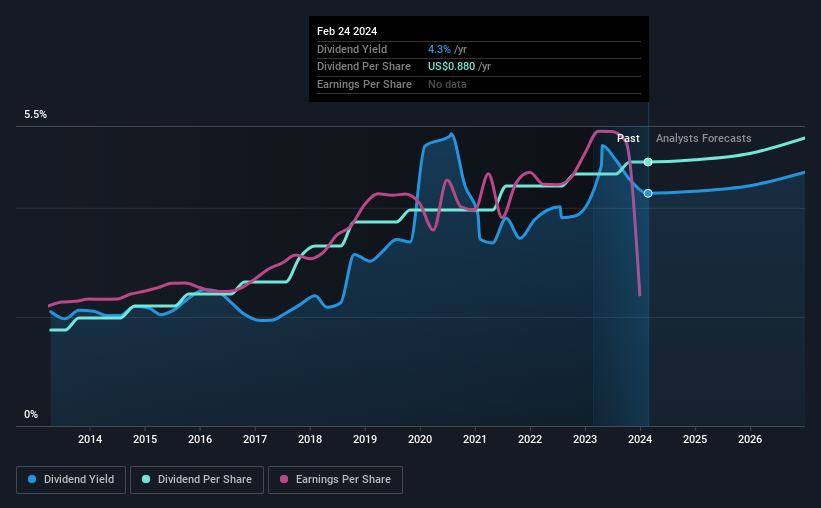Do These 3 Checks Before Buying Associated Banc-Corp (NYSE:ASB) For Its Upcoming Dividend
It looks like Associated Banc-Corp (NYSE:ASB) is about to go ex-dividend in the next four days. The ex-dividend date occurs one day before the record date which is the day on which shareholders need to be on the company's books in order to receive a dividend. The ex-dividend date is important because any transaction on a stock needs to have been settled before the record date in order to be eligible for a dividend. Accordingly, Associated Banc-Corp investors that purchase the stock on or after the 29th of February will not receive the dividend, which will be paid on the 15th of March.
The company's next dividend payment will be US$0.22 per share. Last year, in total, the company distributed US$0.88 to shareholders. Last year's total dividend payments show that Associated Banc-Corp has a trailing yield of 4.3% on the current share price of US$20.63. Dividends are a major contributor to investment returns for long term holders, but only if the dividend continues to be paid. That's why we should always check whether the dividend payments appear sustainable, and if the company is growing.
View our latest analysis for Associated Banc-Corp
Dividends are typically paid from company earnings. If a company pays more in dividends than it earned in profit, then the dividend could be unsustainable. Associated Banc-Corp paid out 75% of its earnings to investors last year, a normal payout level for most businesses.
When a company paid out less in dividends than it earned in profit, this generally suggests its dividend is affordable. The lower the % of its profit that it pays out, the greater the margin of safety for the dividend if the business enters a downturn.
Click here to see the company's payout ratio, plus analyst estimates of its future dividends.
Have Earnings And Dividends Been Growing?
Companies with falling earnings are riskier for dividend shareholders. If business enters a downturn and the dividend is cut, the company could see its value fall precipitously. Readers will understand then, why we're concerned to see Associated Banc-Corp's earnings per share have dropped 9.8% a year over the past five years. When earnings per share fall, the maximum amount of dividends that can be paid also falls.
The main way most investors will assess a company's dividend prospects is by checking the historical rate of dividend growth. Associated Banc-Corp has delivered an average of 11% per year annual increase in its dividend, based on the past 10 years of dividend payments. Growing the dividend payout ratio while earnings are declining can deliver nice returns for a while, but it's always worth checking for when the company can't increase the payout ratio any more - because then the music stops.
To Sum It Up
Has Associated Banc-Corp got what it takes to maintain its dividend payments? Earnings per share have been declining and the company is paying out more than half its profits to shareholders; not an enticing combination. These characteristics don't generally lead to outstanding dividend performance, and investors may not be happy with the results of owning this stock for its dividend.
Although, if you're still interested in Associated Banc-Corp and want to know more, you'll find it very useful to know what risks this stock faces. For example, we've found 1 warning sign for Associated Banc-Corp that we recommend you consider before investing in the business.
If you're in the market for strong dividend payers, we recommend checking our selection of top dividend stocks.
Have feedback on this article? Concerned about the content? Get in touch with us directly. Alternatively, email editorial-team (at) simplywallst.com.
This article by Simply Wall St is general in nature. We provide commentary based on historical data and analyst forecasts only using an unbiased methodology and our articles are not intended to be financial advice. It does not constitute a recommendation to buy or sell any stock, and does not take account of your objectives, or your financial situation. We aim to bring you long-term focused analysis driven by fundamental data. Note that our analysis may not factor in the latest price-sensitive company announcements or qualitative material. Simply Wall St has no position in any stocks mentioned.

